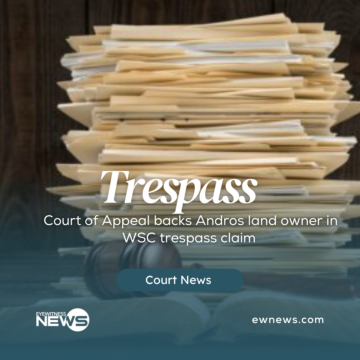
NASSAU, BAHAMAS- —The Court of Appeal has ordered that the Water and Sewerage Corporation (WSC) compensate a woman for trespassing by installing water supply equipment on her property and overturned a judge's ruling that she return a $20,000 cheque from the corporation, which had been an initial payment for using a portion of her land.
In 2009, the appellant, Carla Anita Cecilia Braynen Turnquest inherited a parcel of land in Mangrove Cay as stipulated in her deceased father's will. She was able to establish a documentary title to the property dating back to a 1963 Conveyance. That same year, she engaged a land surveyor to assess the property, who informed her that the Water and Sewerage Corporation had installed holding tanks, pipes, fencing, and related infrastructure, occupying 15,192 square feet of the property, presumably placed there in 2007. The Corporation had also established an access road on the property known as "Wellfield Road."
In 2012, Turnquest notified the Corporation of her ownership and requested compensation for the trespass. She offered to either lease or sell a portion of the property to the Corporation. The Corporation responded, expressing the need for time to investigate the title and did not assert ownership of the property. In 2013, Turnquest followed up on her initial letter.
In 2016, Turnquest inquired about the status of the title investigation. The Corporation responded, requesting proof of ownership and a proposal for the purchase or lease of the property, reiterating this in a subsequent letter. In 2017, Turnquest once again wrote to the Corporation, offering to lease the occupied portion of the property and seeking compensation for the unauthorized occupancy. However, no response was received. In 2018, the Corporation issued a $20,000 cheque to Turnquest, labeled as "the initial payment for use of private land."
In 2019, the Corporation informed Turnquest that an investigation revealed no documentary evidence proving her lawful ownership of the property. Additionally, the Corporation requested the return of the $20,000 cheque. Subsequently, Turnquest sued the Corporation. The trial judge determined that Turnquest did not possess documentary title to the property, and the Corporation held a possessory title. The judge ordered Turnquest to return the $20,000 to the Corporation.
The Court of Appeal, however, has overturned that decision and ruled that the corporation must compensate Turnquest for profits accrued during each year of its unlawful occupation of the property. This compensation includes interest on the profits, damages in lieu of an injunction to remove the water supply equipment, and interest on the sums awarded pursuant to Section 3 of the Civil Procedure (Award of Interest) Act 1992.
"There is no such concept as an "absolute" title to land. Where questions of title to land arise in litigation, the Court is concerned only with the relative strengths of the titles proved by the rival claimants. Compared to a trespasser, a plaintiff who can prove any documentary title to the land is entitled to recover possession of the land unless debarred by the Limitation Act," the Court of Appeal noted.
It added, "In order to succeed on her claim, the appellant needed to demonstrate that her title was superior to the respondent's title. As the respondent alleges that it has a possessory title, the documentary title put forth by the appellant (even with defects) was a better title than the respondent's title. Although the Conveyancing and Law of Property Act requires that the appellant prove a good and marketable documentary title to the property, the learned judge erred in law by holding the appellant to too high a standard. There is no such requirement on an appellant relative to a claim in trespass since a documentary title is superior to an alleged possessory title."
The appellate Court noted that the corporation had acknowledged that the only documentary root of title that exists to the property is Turnquest's title.
"Since there was no other documentary title before the Court, the learned judge erred in finding that the 1963 Conveyance was not a good root of title because it did not identify the property conveyed or contain a recognizable description of the Property. The 1963 Conveyance contained a recognizable description, including, the size, location and description of the land. As the learned judge found "that the survey was properly and is proof of the property surveyed therein", she erred by nonetheless concluding that it did not prove that the Plaintiff owned the property," the Court noted.
It further noted that the judge also erred by requiring the appellant to deduce title before the 1963 Conveyance. "Having found that there was no other documentary root of title other than that of the appellant and finding that the respondent's water supply equipment was on the property, which was properly surveyed, the judge ought to have accepted the 1963 Conveyance as the documentary root of title to the property and proceed to investigate whether the respondent had adversely possessed the Property.
"Land title only needs to be deduced for thirty years. As such, the learned judge was not entitled to require the appellant to deduce a title beyond her 1963 Conveyance."
According to the Court, a person's title to land, including the person who has the documentary title, is only good in so far as there is no other person who can show a better title.
"The effect of adverse possession is that a person who is in possession as a trespasser/squatter without the permission of the paper owner can obtain a good title if the paper owner fails to assert his superior title within the requisite limitation period. After the limitation period has expired, the paper owner's rights will be extinguished."
Click here to read more on the Eye Witness News website





